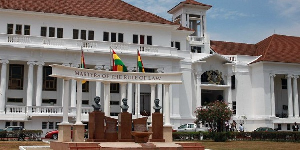Business News of Sunday, 6 August 2017
Source: ghananewsagency.org
Government advised against granting generous tax incentives
The Government has been advised to desist from granting overly generous tax incentives and concessions to multinational companies operating in the country, as the practice is injurious to the economy.
A research by Tax Justice Network Africa indicates that government loses 2.3 million dollars annually in tax concessions and 1.2 billion dollars annually in tax incentives.
Mr Sumaila Abdul-Rahman, Country Director, ActionAid Ghana gave the advice during a panel discussion on the topic: “Extractives and Domestic Resource Mobilisation.”
The panel discussion was on the occasion of the University for Development Studies/Community Water and Sanitation Agency (UDS/CWSA) First Water and Sanitation Hygiene (WASH) Conference held at the Navrongo campus of the UDS in the Upper East Region.
The three-day conference organised on the theme: “WASH: The Successes, Challenges and the Way Forward with Academia,” brought together players from the academia, civil society, governmental agencies, the private sector and the media among others to share ideas on how to improve the WASH sector.
The conference was mainly sponsored by WaterAid Ghana, SNV Netherlands Development Organisation, Catholic Relieve Services and World Vision International.
Mr Abdul-Rahman stated that the extractive industries was one of government’s main sources of revenue but expressed worry that government’s over generous way of granting tax incentives to multilateral companies was robbing the country of the needed revenue for delivering key public services such as WASH.
On the huge deposits of bauxite around the Atiwa Forest and the Government’s 15 billion dollars partnership deal with China, the Country Director of ActionAid Ghana cautioned the Executive to watch out on the tax concessions and incentives in order to rake in the required tax revenue.
“Government needs to be guided by the Meridian Ports experience where the project value was 1.5 billion and the tax incentive was 982 million dollars which was further negotiated by Parliament to 932 million dollars saving the country 50 million dollars as in tax,” he said.
Mr Abdul-Rahman called on the government to publicly review all tax incentives including assessing tax expenditure, ensuring that incentives were well targeted and commensurate with the benefits expected to citizens.
“Government should also ensure that all phases of new incentives require Parliamentary approval, and that any new incentive offered is grounded in legislation, which makes it available to all qualifying investors, foreign or domestic,” he added.
Mr Andrew A. Tagoe, Deputy General Secretary of the General Agriculture Workers Union of the Trades Union Congress, wanted government to grant tax incentives only to local companies instead of multinational companies.
Dr Yao Graham, Third World Network Ghana, called on the government to pick its acts together on domestic resource mobilisation and reduce over dependence on foreign aid.












